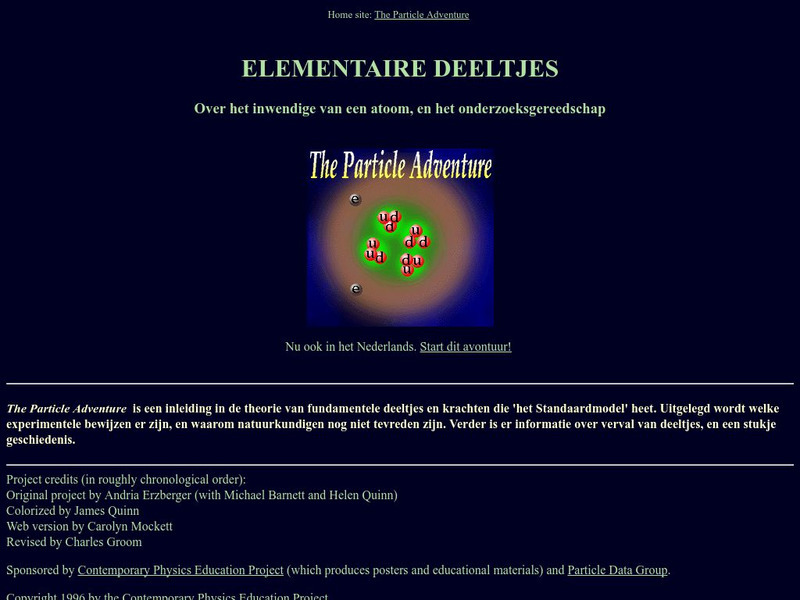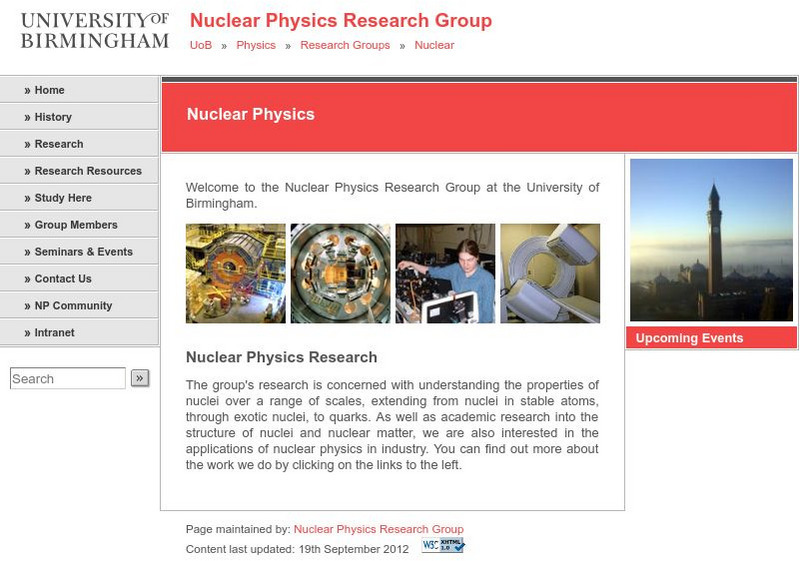Symmetry Magazine
Symmetry Magazine: Explain It in 60 Seconds: Virtual Particles
Virtual particles, described here, are particles that appear and disappear so rapidly they can be detected only by their effect on other particles. "Explain It In 60 Seconds" is an article series that aims to summarize in a few...
Symmetry Magazine
Symmetry Magazine: Explain It in 60 Seconds: Particle Event
Particle events, described in this article, are events that can be observed with a particle detector. "Explain It In 60 Seconds" is an article series that aims to summarize in a few paragraphs the meaning of different concepts in...
Symmetry Magazine
Symmetry Magazine: Explain It in 60 Seconds: Rare Particle Decays
Rare particle decays, described here, are events that could lead to insights into the unknown processes of the universe. Scientists hope to learn more about them through research with particle accelerators. "Explain It In 60 Seconds" is...
Symmetry Magazine
Symmetry Magazine: Explain It in 60 Seconds: Acceleration of Particles
The process of particle acceleration is described. "Explain It In 60 Seconds" is an article series that aims to summarize in a few paragraphs the meaning of different concepts in particle physics.
Symmetry Magazine
Symmetry Magazine: Explain It in 60 Seconds: Particle Accelerators
Particle accelerators and what how they are used in research are explained briefly but succinctly here. "Explain It In 60 Seconds" is an article series that aims to summarize in a few paragraphs the meaning of different concepts in...
PBS
Pbs Learning Media: String Theory: Elementary Particles
This interactive activity from the NOVA Web site looks at the fundamental forces and particles that make up all matter. A thorough description of each elementary particle is provided including their mass, charge, spin, strength, and range.
Concord Consortium
Concord Consortium: Molecular Workbench Showcase: Physics, Quantum Physics
A collection of simulations to show the important topics of quantum physics.
University of Colorado
University of Colorado: Ph Et Interactive Simulations: Self Driven Particle Model
An interactive tutorial that introduces the particle model incrementally and depicts the computation of the order parameter, critical parameter, and critical exponent.
Science Struck
Science Struck: What Is the Higgs Boson Particle?
A detailed explanation of the Higgs Boson particle and the science of particle physics. Discusses the history of the search for this particle, the ongoing research with the Large Hadron Collider at CERN in Europe, and what is known so...
Lawrence Berkeley National Laboratory
Berkeley Lab: The Particle Adventure: Leptons
This particle physics tutorial discusses the different types of leptons: the electron, tau lepton, muon lepton, and neutrinos.
Other
Particle Adventure Dutch Version
Dutch version of the well-known "Particle Adventure" physics website that teaches students about atoms, mass, particle physics, and quantum physics. The site discusses theories related to physics and provides other links related to the...
American Association of Physics Teachers
Com Padre Digital Library: Open Source Physics: Circular Well Model
This downloadable java simulation models the 2D energy eigenstates of a particle trapped in a very deep two-dimensional circular well.
Other
University of Birmingham: The Nuclear Physics Group
This is the website of the Nuclear Physics Group at the University of Birmingham. There is information on research, degrees, seminars, etc.
Other
Particles, Special Relativity and Quantum Mechanics
Quantum physics, despite its inherent weirdness, is thus far the best model physicists have for explaining the universe. This site gives a great overview of the principles of quantum mechanics and gives scenarios to help the reader...
Georgia State University
Georgia State University: Hyper Physics: Wave Particle Duality
The dualistic nature of light is discussed. The photoelectric effect and the Davisson-Germer experiment are contrasted as empirical evidence supporting each of the two views - particle and wave - of the nature of light. The photoelectric...
Khan Academy
Khan Academy: Start: How Do Computers Simulate the Motion of Virtual Particles?
In this lesson we'll explore how we use fairly simple physics to draw particles which move according to the forces we feel in the real world (such as wind & gravity).
Khan Academy
Khan Academy: Applying Gravity to a Particle
Next, let's apply all these ideas to the case where a particle is being acted on by both gravity and air resistance using this 5-question quiz/practice. The gravity force vector points downward, and the air resistance force opposes it.
Other
Lancaster University: Particle Physics Package: Higgs: Detector
Details on ATLAS, one of the Large Hadron Collider experiments, and on the detection of Higgs decay.
Other
Lancaster University: Particle Physics Package: Large Hadron Collider
Learn what the Large Hadron Collider (LHC) is, when it was built, what it contains, and how it will help scientists better understand the universe by finding the Higgs field and solving the "mystery of antimatter." Includes very simple...
TED Talks
Ted: Ted Ed: Cern's Supercollider
In this video, Brian Cox provides a brief overview of particle physics and discusses the role of the Large Hadron Collider at CERN. [14:57] Followed by a short quiz and a list of additional resources to explore.
Other
Particle Physics at Discovery's Horizon: What Is the Lhc?
An introduction to the Large Hadron Collider (LHC), offering information on its location, its experiments, and what scientists hope to learn through this machine buried below Geneva, Switzerland. Click a menu of links to read details...
Khan Academy
Khan Academy: Applying Gravity to a Particle
Understand how we simulate the effect of gravity on a particle.
Symmetry Magazine
Symmetry Magazine: Explain It in 60 Seconds: Jets
Jets, described in this article, are particle sprays resulting from other particles colliding at high speeds, such as can happen in particle accelerators. "Explain It In 60 Seconds" is an article series that aims to summarize in a few...
CK-12 Foundation
Ck 12: Physical Science: Fundamental Particles
[Free Registration/Login may be required to access all resource tools.] Investigates fundamental particles and their discovery, and how they relate to fundamental forces.













